
New Year's Eve may end with a bang, but in New Orleans New Year's Day often begins with a dish. <!-- end jp-progress --><!-- end jp-controls -->Listen<!-- playpause --><!-- jp-time-holder --> Is it better to be lucky, or rich, and aren't the two sometimes closely related? Those are the questions we here in south Louisiana must ponder when peering into the cooking pot on New Year's Day in a place where food traditions hold powerful sway.These traditions certainly don't get the day off just because home cooks and houseguests may have been up a little too late the night before. Fortunately, the most poplar traditional dish for New Year's Day in these parts is simple to make, it’s hearty enough to gird you for a winter holiday, and, perhaps most importantly, some say it can also bring luck and money in the year ahead for those who eat it. Of course, we're talking about cabbage and black-eyed peas.This dish is by no means an exclusive Louisiana or New Orleans New Year's tradition. People all over the South and elsewhere partake in this dish, or something quite similar, on January 1st. But the custom has taken a firm grip here, and that's really no surprise. This is a place where people love to talk about food, and a good storyline always helps to endear a dish. In this case, the main ingredients are said to be symbols. We eat black-eyed peas for luck in the new year, and we eat cabbage to bring luck's perennial running partner: money. It's the light green color of the raw cabbage and the paper-thin leafs themselves that are meant to resemble cash.Many different regions and cultures maintain the same association with beans and green leafy vegetables. As usual, though, we tend to carry this tradition a little further. There are tales of New Orleans families who, on New Year's Day, actually pin leaves of cabbage to the lace curtains in their homes, and let them dangle there, hoping the extra effort would help draw in the greenbacks.Money and luck strike a universal chord, and there's no reason why a New Year's Day meal in New Orleans must be confined to local tradition. Cultures around the globe hold their own beliefs about lucky foods for the New Year, and some of them play out quite well here.For instance, many local Italian Americans trace their family roots to Sicily, and some Sicilians swear good luck will come by eating lasagna on New Year's Day. Happily, lasagna is an easy make-ahead dish, one that even cooks feeling the most weary on New Year's Day can manage to heat through.Pig is big in a lot of traditional New Year's celebrations. Their plump, portly figures are said to symbolize abundance and prosperity, and in south Louisiana we can count the blessings of a many-splendored trove of locally distinctive smoked and seasoned pork products to add to our New Year's table. In another tradition, some Japanese people eat shrimp for longevity, seeing the hunched back of advanced age in the curve of the cooked shrimp tail. Well, Louisiana is the top producer of American shrimp, and these beauties are abundantly available all over New Orleans.Whatever fortune may visit us in 2013, on New Year's Day we can all count ourselves lucky to be part of this city's rich food traditions.

